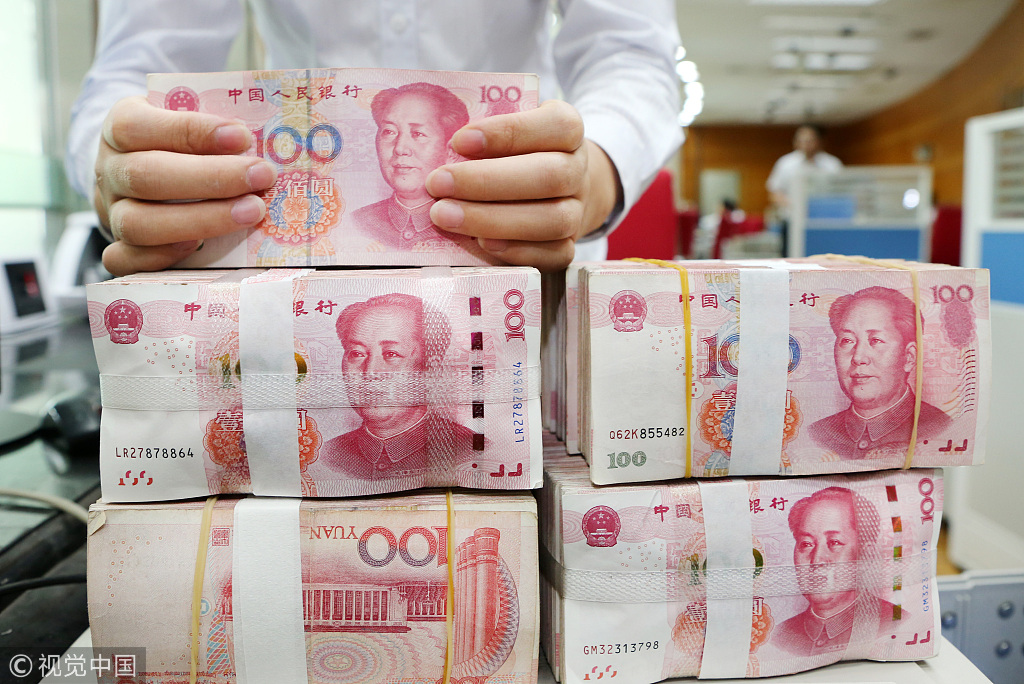Analysts: Investors still bullish on yuan holdings


Renminbi holdings in global portfolios will continue to increase this year as investors continue to cash in on China's high-quality growth story, notwithstanding the lingering trade friction, analysts said on Monday.
The trade disputes have roiled the Shanghai and Shenzhen bourses, with the benchmark Shanghai Composite Index losing 4.52 percent last week and extending the losses by 1.21 percent on Monday to close at 2903.71 points. But analysts expect the trend to reverse soon.
Meanwhile, the renminbi also depreciated against the greenback. On Monday, the spot rate of offshore renminbi against the US dollar weakened to 6.90, the lowest since the end of last year. However, the short-term market fluctuations did not sway analysts' confidence in renminbi assets.
Cheng Shi, chief economist of ICBC International, said renminbi assets will continue to be attractive for global investors during the rest of the year as the Chinese economy is set to stabilize and see rapid progress in high-quality development.
"On the one hand, China's growth is set to stabilize. Against the backdrop of a stumbling world economic recovery with mounting financial risks, China's growth prospects may make renminbi assets more attractive than assets denominated in other currencies," Cheng said.
On the other hand, thanks to a new round of reform and opening-up, high-quality development may speed up this year, catalyzing investment opportunities from the new economy and consumption upgrade, Cheng said.
"As can be seen from the experiences of other economies, capital markets are the barometer of economic development. The markets often thrive as an economy changes gear to higher-quality development," he said.
Data compiled by Haitong Securities coincided with Cheng's remarks. According to the Shanghai-based brokerage, the bull run of the A-share market during the January-April period was led by sectors like daily consumption, information technology, telecommunication services and healthcare.
Since the beginning of the year, renminbi assets have been increasing their allure for global investors. During the January-April period, the Shanghai Composite Index, the benchmark of China's A-share market, rose by 23.4 percent and topped the returns, in US dollar terms, of all major global risky asset gauges sampled by Deutsche Bank.
The strong performance of Chinese stocks also helped usher in more foreign capital. During the first quarter, overseas institutions purchased $19.4 billion A shares, equivalent to 45.6 percent of last year's total net purchases, according to the State Administration of Foreign Exchange. Meanwhile, domestic onshore bonds - the other major type of renminbi assets - saw net purchases by overseas institutions of over $9.5 billion during the first quarter, said the foreign exchange regulator.
Dong Dengxin, director of the Finance and Securities Institute at Wuhan University of Science and Technology, said renminbi assets may be a safe haven for investors from global uncertainties this year.
"The European and US stock markets may face downside risks this year, while the Chinese stock market has a historically low valuation, setting a foundation for accelerated foreign capital inflows to the Chinese market," he said.
In the longer term, the share of renminbi assets in global capital portfolios will continue to ramp up, Dong said, adding that global investors will not ignore the rapid development of the world's second-largest economy.
Jing Ulrich, vice-chairwoman of Asia-Pacific at JPMorgan Chase & Co, agreed. She said that twists and turns in the trade talks or other short-term factors are unlikely to change global investors' appetite for renminbi assets in the mid-to-long term.
The share of renminbi assets in global investors' portfolios is still "very little" with rapid growth potential, while financial opening-up is helping fulfill the potential by making foreign investors more confident and capable of investing in China, Ulrich said at a recent press briefing.




































